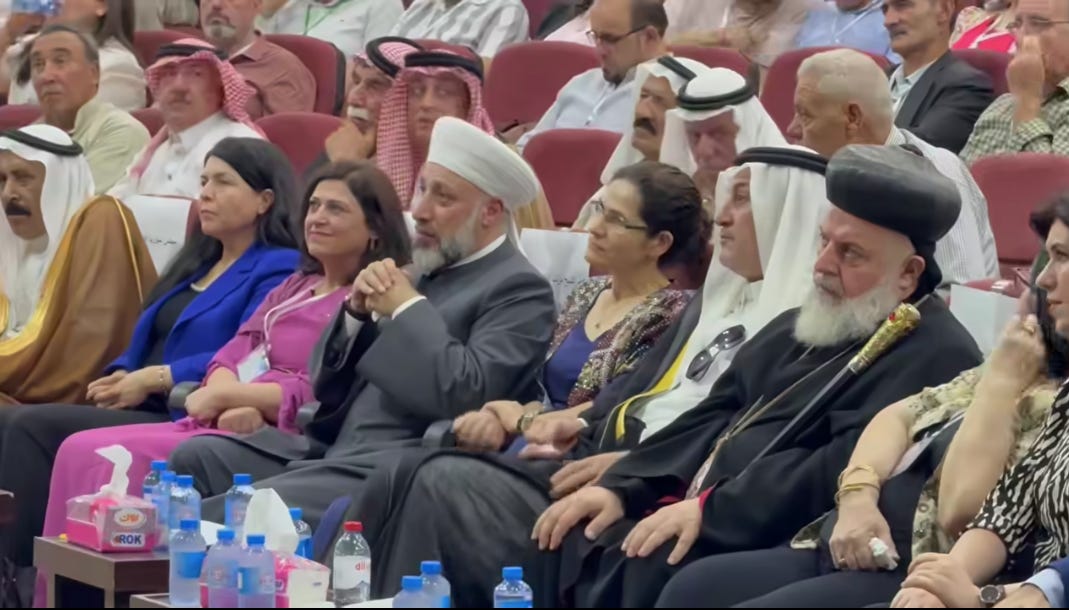Guest Post: The Need for an 'Alliance of Minorities' in Syria
Recently, the ‘Syrian Democratic Forces’ (SDF, which is dominated by the Kurdish ‘Democratic Union Party’ and its armed wing the YPG) held a conference in Hasakah city in northeast Syria that included the remote participations of Druze spiritual leader Hikmat al-Hijri as well as Alawite spiritual leader Ghazal Ghazal (who enjoys particular support among Alawites who are more skeptical towards the new Syrian government).
The conference’s concluding statement, which calls for enshrining of principles of religious and ethnic pluralism and constitutional guarantees for decentralisation, can basically be seen as a reaffirmation of the SDF’s desire to have its political project granted official legitimacy by the central government. In turn, it is clear that the SDF is reaching out to leading religious minority figures who support notions of decentralisation, not in order to expand SDF control to their areas but in the belief that this outreach will constitute an additional pressure tool on the central government to accept its political project and concepts of decentralisation throughout Syria.
Thus, despite the March agreement that appeared to mark concessions to the central government by the SDF and was likely the result of U.S. pressure on the SDF, a final resolution is still a long way off, because the SDF essentially wants the government to recognise its project whereas the government wants to impose central control over the SDF-held areas.
While Hikmat al-Hijri has been the highest profile Druze figure advocating for guarantees for decentralisation, sympathy for decentralisation among Druze went beyond Hijri and those declaring affiliation with him even before the recent events in al-Suwayda’. Sympathy and support for decentralisation have gained grown following those events that have seen large numbers of Druze killed and displaced.
In this post, Ziyad Abu Tafesh, spokesman for Druze faction Liwa al-Jabal that does not declare affiliation with Hijri, writes on what he sees as the need for an ‘alliance of minorities’, not to wage an insurgency to overthrow the central government or to endorse expansion of the SDF, but rather to build a unified platform for advocating a more inclusive national vision of Syria.
Towards a patriotic humanitarian alliance among Syria’s minorities in the face of extremism and terrorism
By Ziyad Abu Tafesh
Amid the complex changes and intertwined conflicts that the Syrian scene is witnessing, it has become necessary and pressing for the components of Syrian society to become closer to each other, especially the religious and ethnic minorities, including Christians, Alawites, Kurds, Druze, Assyrians, Ismailis and others, so they can form a cohesive front defending their rights and existence, and protecting what remains of patriotic and humanitarian values in the face of the projects of terrorism and extremism.
Experience has shown that these components were historically the closest to mutual understanding and openness, and the furthest removed from takfiri* thought or religious violence, for they are communities based on tolerance, pluralism and co-existence, and at most stages of history avoided being drawn into ideological violence which was and still is represented by the ideology of al-Qaeda and its branches like Jabhat al-Nusra (Hay’at Tahrir al-Sham), led by al-Jowlani, which impose their extremist visions on areas subject to their control through force of arms and terrorisation.
This desired alliance is not directed against a sect or component, but rather is a righteous stance in the face of dangerous ideology that threatens the future of all, including the moderates among the Sunni majority, who are also victims of this takfiri ideology. Here, the call to stand up to the terrorist Jowlani government is a call to protect what remains of pluralistic Syria: the Syria that Syrians dreamed of before it was stolen by militias and external interventions.
This stage requires a true unity built on foundations of mutual repect, justice and national partnership, not sectarian alignment, for the alliance of minorities is not a project of separation, but a project of balance that restores consideration for the rights of the marginalised, and prevents forces of darkness from gaining a monopoly over any component of Syrian society.
So let us all- as minorities and majorities- be partners in building a homeland that accommodates all, devoid of terrorism, domination and takfir.
—————-
* Takfir- declaring people to be non-Muslims, used in this sense to mean sanctioning violence and abuses against others on that basis.


